
UP-TO-DATE, RESEARCH BASED INFORMATION ABOUT PSYCHEDELICS.
Psychological effects of psychedelics in adolescents
To our knowledge, this is the first prospective study to examine the psychological effects of psychedelic use specifically in adolescents. Statistically significant improvements in psychological well-being and other domains of mental health were observed, consistent with effects seen previously in adults, providing tentative evidence for the potential utility of psychedelic interventions in adolescents.
Psychedelics, OCD and related disorders: A systematic review
This review contributes to our understanding of the potential of classic psychedelics (in particular LSD and psilocybin) as novel therapeutic interventions for OCD and related disorders, offering insights into future research directions and clinical applications in this emerging field.
Microdosing psychedelics: Current evidence from controlled studies
Acute microdoses of LSD dose-dependently altered blood pressure, sleep, neural connectivity, social cognition, mood, and perception of pain and time. Perceptible drug effects were reported at doses of 10 to 20 μg but not 5 μg. No serious adverse effects were reported.
Community-based psychedelic integration and social efficacy: An ethnographic study in the Southeastern United States
Community-based non-therapeutic integration groups can play a vital role in the positive integration of psychedelic experiences, improving mental health and quality of life for users.
Evolving guidelines for the use of touch during a clinical trial of group psilocybin-assisted therapy
For a new clinical trial testing a group retreat-based format of psilocybin-assisted therapy, our research team created an initial set of practice guidelines that aimed to describe facilitator use of touch in a way that is ethical, supportive, and minimizes harm.
Breaking news: F.D.A. panel votes against MDMA-assisted therapy for PTSD
On Tuesday, the Food and Drug Administration’s Psychopharmacologic Drugs Advisory Committee voted overwhelmingly to reject MDMA-assisted therapy in the treatment of post traumatic stress disorder, or PTSD. The FDA will issue its final decision on the matter in mid-August but in the majority of cases, the federal agency’s decisions align with the vote of the independent panelists on advisory committees.
Attitudes of psychedelic users regarding cost of treatment and non-hallucinogenic alternatives
Participants valued the role of altered states of consciousness in therapeutic changes attributed to psychedelics, but were still open to trying a non-hallucinogenic analog. Notably, the price participants considered to be a reasonable amount for PAP is well below current market projections.
How do psychedelics reduce fear of death?
Increasing evidence suggests that psychedelic experiences, undergone in controlled conditions, can have various durable psychological benefits. One such benefit is reductions in fear of death, which have been attested in both psychiatric patients and healthy people. This paper addresses the question: how, exactly, do psychedelic experiences reduce fear of death?
Navigating groundlessness: An interview study on dealing with ontological shock and existential distress following psychedelic experiences
We conducted semi-structured interviews with 26 people who reported experiencing existential distress following psychedelic experiences. We explored the phenomenology of participants’ difficulties and the ways they navigated them, including what they found helpful and unhelpful in their process.
Measuring psychotherapeutic processes in the context of psychedelic experiences: Validation of the General Change Mechanisms Questionnaire (GCMQ)
We report the initial validation of the General Change Mechanisms Questionnaire (GCMQ), a self-report instrument designed to measure five empirically established general change mechanisms (GCMs) of psychotherapy—(1) resource activation, (2) therapeutic relationship, (3) problem actuation, (4) clarification, and (5) mastery—in the context of psychedelic experiences.
The Hopkins-Oxford Psychedelics Ethics (HOPE) working group consensus statement
Participants at the workshop discussed the ethical aspects of psychedelics, including research methods, clinical practices, history, law and society, spirituality, community, culture, and politics that arise in relation to psychedelics.
16th annual Horizons conference: Perspectives on psychedelics
Here's a YouTube treasure trove of nearly thirty free full length presentations from this month's Horizons conference in New York.
Is it now time to prepare psychiatry for a psychedelic future?
This feature explores the reasons for these developments, the opportunities and challenges they provide to psychiatry communities and how along with health systems these communities might respond to these developments.
Experiences of awe mediate ketamine’s antidepressant effects: Findings from a randomized controlled trial in treatment-resistant depression
Ketamine infusion strongly induced heightened feelings of awe, and these experiences consistently mediated depression outcomes over a 1- to 30-day period, unlike general dissociative side effects.
Investigating the relationship between changes in metaphysical beliefs and death anxiety following a significant psychedelic experience
Improvements in death anxiety were positively correlated with changes in belief in panpsychism (which posits that consciousness is a fundamental feature of all things), but no other measured metaphysical beliefs.
Effects of external stimulation on psychedelic state neurodynamics
Results show that while brain entropy increases with LSD under all of the experimental conditions, it exhibits the largest changes when subjects have their eyes closed.
Indigenous psilocybin mushroom practices: An annotated bibliography
This annotated bibliography comprises 49 texts concerning psilocybin mushroom practices developed by Indigenous peoples.
Perceptions and attitudes towards psychedelic-assisted psychotherapy among health professionals, patients, and the public: A systematic review
The sample consisted of 29 studies, including n = 17 health professional, n = 6 patients, and n = 6 public. Broadly, knowledge of PAP was low among all three stakeholder groups. There was mixed to positive belief in the therapeutic potential of psychedelics.
Recreational use of psychedelics at music festivals: Motivation, nature of experiences and learnings
The present research study investigated the phenomenon of recreational use of psychedelics at music festivals, analysing whether the resulting experiences could possibly be recognized as valuable in terms of preventive mental health strategies.
The effect of psychedelics on individuals with a personality disorder: Results from two prospective cohort studies
For individuals with PD, psychedelic use was associated with improvements in psychological functioning. There were no clinically significant elevations in SI and several cases of elevations in anxiety and depression severity. The studies are limited by a small sample size, self-reported data, and lack of differentiation between PDs. Further research should explore the safety and potential therapeutic effects of psychedelics among individuals with PD.




















